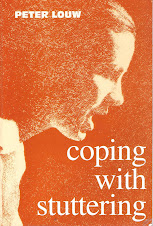The book is based on the latest neurological research and has been applauded both by ordinary readers and experts in the field, as you will see on Amazon. And it's not even expensive; and relatively short and an easy read!
I've read it and it is uncanny to what extent the book aligns not only with stuttering, but all other mindbody issues. In fact it confirmed once again to me that stuttering is NOT a standalone speech disorder, but part of a much larger family of tension/stress-related issues, including many digestive complaints such as irritable bowel syndrome, tension headaches and migraines, the list goes on and on.
Do yourself a favour and read this book carefully, preferably twice; and above all, begin to apply the author's suggestions in your own life! I think this is a major book not only for people who stutter, but speech therapists and others in the field. Whether they will listen is another matter.
The core point which Gordon makes is the relatively simple notion that mindbody ailments can arise when the primitive part of the brain perceives (note the word PERCEIVES) that it is unsafe. That's really it - it's not brain surgery! To that I would add that, in our case, our brain probably decided, when we were young and immature, that, for some reason, speaking - including expressing ourselves through speech - is unsafe.
So what can be done about it? Once again, the answer is simple, but not so easy to do: Teach the brain that it is in fact safe, that its original perception was incorrect. But how do we teach it? By feeding it messages of safety, and avoiding messages that it is not safe.
Examples of safety messages could be: not obsessing about the symptoms; not panicking about or overreacting to the symptoms, but lightly (even smilingly) accepting them mindfully as not dangerous. This signals to the brain that the symptoms are harmless and that there is no reason for the brain to be disturbed. (This doesn't mean accepting symptoms permanently as so many misguided people who stutter have been recommending for ages; no, the long-term goal is to gradually eliminate them, but accept them in the short term so that the primitive brain won't regard them as a threat); having a generally positive outlook - negative thinking alerts the brain that there is danger; making a point of relaxing and seeking out entertainment, and generally enjoying life (a tense body and stressed lifestyle signals danger to the brain); slow, relaxed breathing and gradually exhaling; and so on.
Gordon makes a fascinating point about avoidances in general. Now, in the stuttering area, avoiding difficult situations usually is said to be a big no-no as such avoidances tend to increase stuttering in the long term. But more recent research indicates that avoiding high-stress situations can benefit us if it preserves the brain's "safety status". The primary objective, according to Gordon, must always be to make the brain feel safe. E.g. if we do take on a highly stressful situation which would bring about severe stuttering, the brain is going to feel very unsafe, which would delay our recovery. Far better to do "baby steps", gradually moving from easy to more difficult situations, but always working from a position of strength. In other words, using gradual desensitisation to reduce stress, always working to further strengthening the brain's feeling of safety in speech and expression.
As you can see, this really implies a particular lifestyle, all aimed at bringing about a mindset which should ultimately teach the brain that it is safe when speaking, even if we should stutter, even when stressed. Yes, stress doesn't have to trigger symptoms IF the brain has been taught that it is safe even when stressed.
A summary such as this doesn't do justice to an important book, so do check out the first free sections of the book on Amazon and the readers' reviews to see what it's all about. You won't be sorry! Click on this link to go to Amazon.







It's a phenomenal book and definitely helps in the struggle and prevalence of mind-body disorders, and yes, stuttering is a bi proud of the brain feeling unsafe to express itself, so in attempt to protect you, it's trying to prevent you from expressing yourself.
ReplyDeleteThus book is healing my entire life! Page by page! It's phenomenal!
ReplyDeleteI am glad that you find it useful, Brian! Yes for me it was the missing piece in the puzzle which used to be stuttering. Doesn't it all make absolute sense? But actually following the advice from Gordon and others is not so simple. It requires daily "mindwork" - sending "safe" signals to the brain requires a different mindset.
Delete